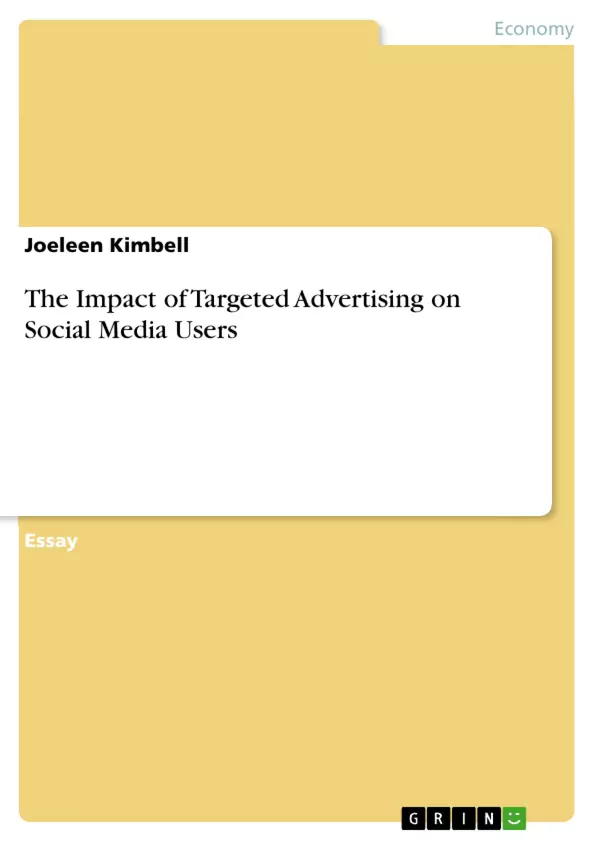This research essay explores and discusses the impact of target advertising on social media users. This targeting is good for businesses as it leads to higher levels of interaction, thus improving their ROI. It is usually adaptable in real time. However, the article has a privacy issue, where people's data is collected many times without the user's permission, making them uncomfortable or even feel that they are being monitored. Furthermore, the research analysis looks at the psychological consequences of the targeted advertising approach for consumers and how this narrows consumer choice in favor of consumption and shapes consumers' self-esteem, especially among vulnerable populations. This is because theme-related advertisements, such as those related to luxury products or physical attractiveness, create unrealistic expectations that, in turn, lead to dissatisfaction and, in extreme cases, mental issues like eating disorders and depression. The research suggests the improvement of data protection laws and increased responsibility of industries to solve these ethical concerns, therefore claiming an equilibrium between the benefits of personalized advertising and users' rights.
Inhaltsverzeichnis (Table of Contents)
- Abstract
- 1.0 Background and Introduction
- 2.0 Improved and Effective Advertising
- 3.0 Privacy Issues
- 4.0 Psychological Implications
- 5.0 Conclusion
Zielsetzung und Themenschwerpunkte (Objectives and Key Themes)
This research essay aims to explore the impact of targeted advertising on social media users, examining both its benefits for businesses and its potential negative consequences for users. It investigates the effectiveness of targeted advertising, the privacy concerns it raises, and its psychological effects on consumers.
- The effectiveness of targeted advertising in improving business ROI and user engagement.
- Privacy concerns related to data collection and the potential for surveillance.
- The psychological impact of targeted advertising on consumer choice and self-esteem.
- The ethical implications of targeted advertising and the need for better data protection.
- The balance between the benefits of personalized advertising and user rights.
Zusammenfassung der Kapitel (Chapter Summaries)
1.0 Background and Introduction: This chapter introduces the increasing prevalence of targeted advertising on social media platforms and its reliance on user data. It highlights the benefits for businesses but also raises concerns about privacy and psychological impact.
2.0 Improved and Effective Advertising: This section details how targeted advertising improves efficiency and effectiveness for businesses by focusing marketing efforts on interested users, resulting in higher conversion rates and better return on investment (ROI). It contrasts this with older, less targeted advertising methods. The adaptability of targeted advertising in real time is also highlighted.
3.0 Privacy Issues: This chapter will likely discuss the ethical and legal issues surrounding the collection and use of user data for targeted advertising purposes, emphasizing the lack of user consent and the potential for feeling monitored.
4.0 Psychological Implications: This chapter focuses on the psychological consequences of targeted advertising, especially the influence on consumer choices and the creation of unrealistic expectations leading to dissatisfaction and potential mental health issues.
Schlüsselwörter (Keywords)
Targeted advertising, social media, privacy, psychological impact, consumer choice, data protection, ROI, user engagement, ethical concerns, mental health.
- Arbeit zitieren
- Joeleen Kimbell (Autor:in), 2024, The Impact of Targeted Advertising on Social Media Users, München, GRIN Verlag, https://www.hausarbeiten.de/document/1511726


